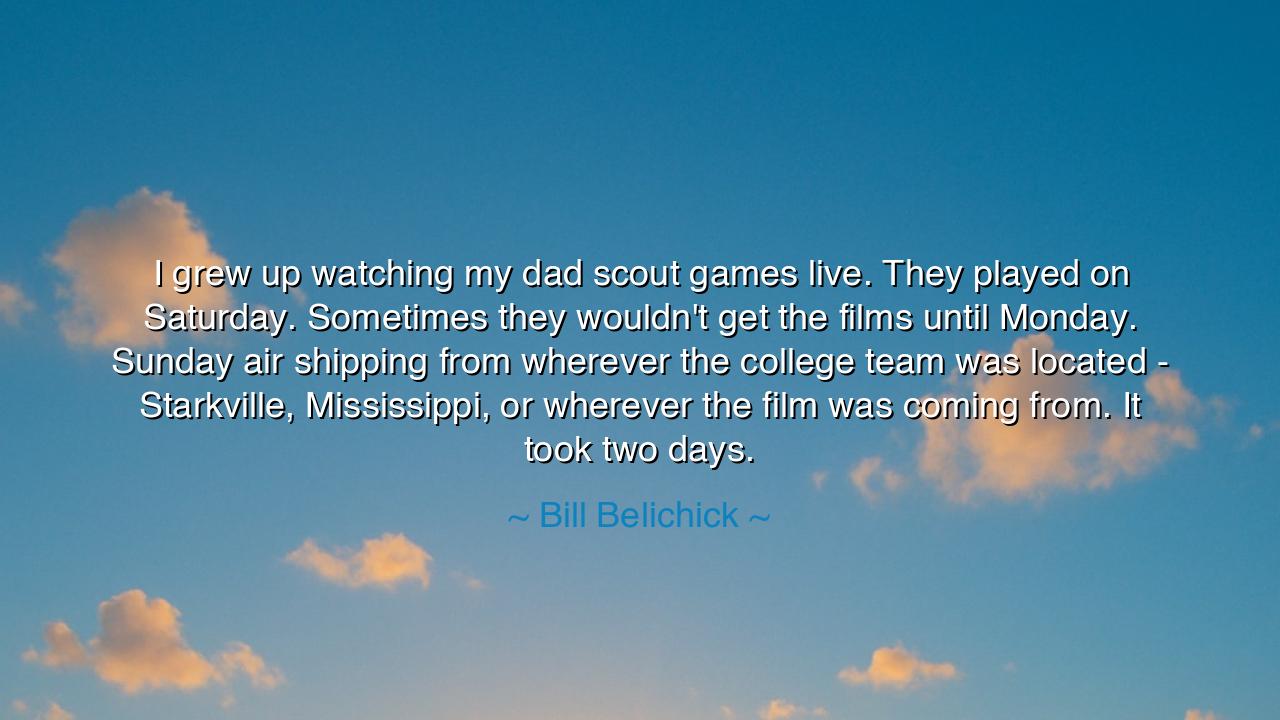
I grew up watching my dad scout games live. They played on
I grew up watching my dad scout games live. They played on Saturday. Sometimes they wouldn't get the films until Monday. Sunday air shipping from wherever the college team was located - Starkville, Mississippi, or wherever the film was coming from. It took two days.






When Bill Belichick said, “I grew up watching my dad scout games live. They played on Saturday. Sometimes they wouldn't get the films until Monday. Sunday air shipping from wherever the college team was located — Starkville, Mississippi, or wherever the film was coming from. It took two days,” he was not merely recalling a childhood memory — he was honoring a heritage of patience, discipline, and devotion. In this simple recollection lies a profound truth: that greatness is not born in haste, but forged in the slow fire of persistence and the long rhythm of dedication. His words speak not of glamour, but of craftsmanship, of the ancient way of mastery — the way of those who labor unseen, who wait, who learn, and who build from the ground up.
Belichick’s father, Steve Belichick, was a scout and coach at the U.S. Naval Academy — a man of study and structure, who lived by the creed that excellence was earned through preparation. In an age before instant replay, before the easy miracles of technology, scouting was a test of will and observation. There were no screens to deliver truth with a click — only the eyes, the mind, and the notebook. To study a team meant traveling across the land, watching, recording, and waiting days for the film to arrive by air. It was a ritual of diligence, and the young Bill, sitting quietly beside his father, absorbed not merely the game but the discipline of detail.
In this, we see the origin of Belichick’s genius. The boy who watched his father pore over delayed footage became the man who would one day build dynasties through preparation unmatched. The waiting, the note-taking, the patience to learn before acting — these were his inheritance. The great coach of the modern era was raised in the slow school of the past, where men learned that mastery is a long conversation with time. His words remind us that before the age of speed, wisdom grew in silence and repetition, and those who respected the process became the masters of the result.
Consider the parallel with the artisans of old — the blacksmith who stood before the forge, the painter who ground his own pigments, the scholar who copied his texts by hand. All of them knew what Belichick’s father knew: that excellence demands endurance. The ancients would have called this areté — the virtue of mastery achieved through devotion. For when the work is slow, the worker must be steadfast; and when the world offers no shortcuts, the soul learns to grow strong. This is the same truth the coach discovered in those early days — that wisdom cannot be rushed, and that greatness, like film developing in the dark, requires time to emerge.
Belichick’s quote is not about football alone. It is about the spirit of craftsmanship in any field. Whether one builds teams or temples, the same law holds true: one must watch, study, wait, and learn. The impatience of modern life — the desire for instant results — has stripped many of this virtue. But those who understand the power of delay, who respect the slow rhythm of preparation, will always surpass those who seek speed without understanding. For speed may deliver action, but patience delivers mastery.
Let us then take this lesson to heart. Be not ashamed of slow progress. Be not disheartened by the time it takes to learn. The ancient builders of cathedrals began work knowing they would never see the final stone laid — yet they built, for they believed in something larger than themselves. So too must we build our own crafts, our own lives, one lesson, one effort, one patient act at a time. Honor the process, for it shapes the spirit as much as it shapes the work.
And finally, remember this: the films may take two days to arrive, but wisdom — once gained — endures for a lifetime. What matters is not how fast the film reaches your hands, but how deeply you study what it shows. Thus spoke Belichick, the son of patience — teaching through his memory that mastery is not a gift, but a legacy of discipline passed from one generation to the next. Those who wait, observe, and prepare shall one day command the field — not by luck, but by earned understanding.






AAdministratorAdministrator
Welcome, honored guests. Please leave a comment, we will respond soon